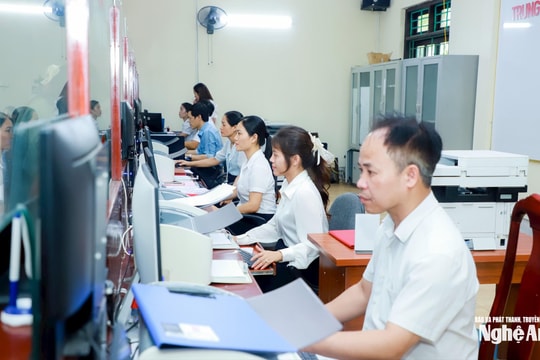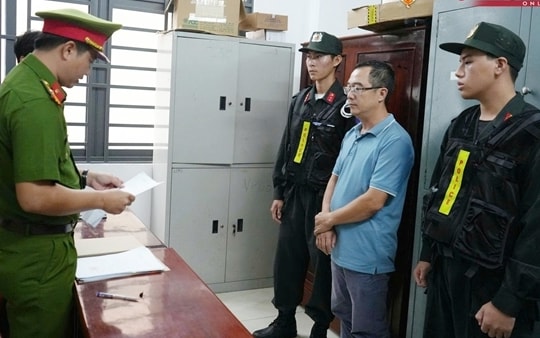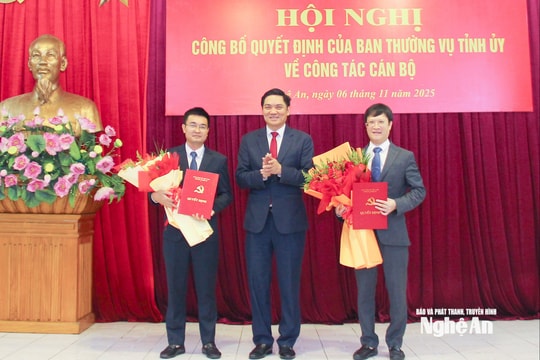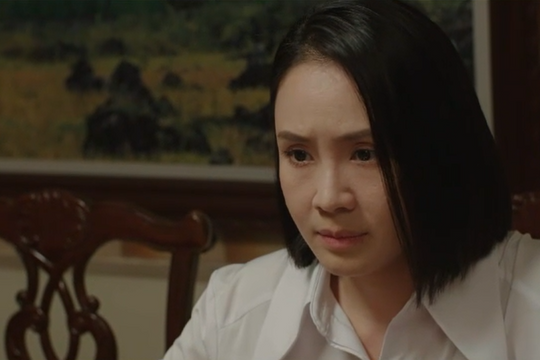Appointment of Mr. Trinh Xuan Thanh and the story of 'son of a high-ranking official'
According to Mr. Vu Mao, the case of Mr. Trinh Xuan Thanh or some other cases of children of leaders being promoted quickly need to be clarified and announced to the people.
Along with the "correct procedure" appointment of Mr. Trinh Xuan Thanh, former Vice Chairman of Hau Giang Provincial People's Committee, the appointment of Mr. Vu Quang Hai (son of Mr. Vu Huy Hoang, former Minister of Industry and Trade) as Deputy Director of Saigon Beer Alcohol Beverage Corporation (Sabeco) is attracting public attention. Besides the question of what procedure is here, the address of responsibility for making the appointment decision according to the correct procedure, the story of "children of the boss" in personnel work is once again mentioned. On this issue, the reporter interviewed Mr. Vu Mao, former Head of the National Assembly Office.
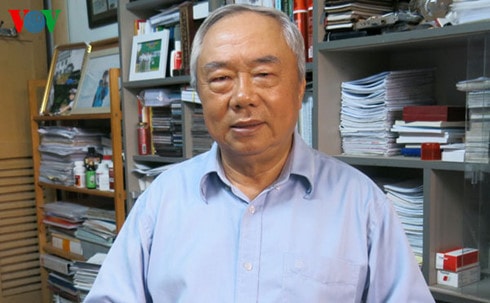 |
| Mr. Vu Mao, former Head of the National Assembly Office. Photo: VOV |
There are interest groups and factions in personnel work.
PV:No one knows since when, when someone is appointed to a leadership position or simply recruited into a state agency, the first question people often ask each other is: "Whose son is this comrade?". What is your comment on this question from the public?
Mr. Vu Mao:This question is not too new, it has been asked for a long time. But in the past 10-15 years, this question has received more public attention and many issues have been raised about an unusual phenomenon that the public does not agree with.
In fact, this also belongs to the interest group, reflecting the ethics and qualifications of leaders at all levels. They have power and position but have been corrupted and degenerated. They have not maintained the impartiality and purity of revolutionary cadres and party members, but they have used their power and taken advantage of it to seek benefits for their children.
This is also included in the general assessment and criticism of the Party at the 4th Central Conference, 11th term, which mentioned the degeneration, degradation, and moral decline of a not small number of cadres, including high-ranking cadres in the Central Committee.
PV:There would be nothing worth mentioning if the advancement of these cases were not so fast, even just in a few months, and when discovered, it was always explained that they followed the correct regulations, procedures, and planning, sir?
Mr. Vu Mao:The work of training, educating, and promoting young cadres is an inevitable trend of our Party's revolution and in fact, countries around the world are also interested in this. For a long time, we have also been interested in training and fostering young cadres, but there must be procedures. When talking about this, people often say that we follow the correct procedures. But in fact, the problem here is that the person being promoted lacks a basic thing: lack of practice and lack of experience.
If a person has just graduated from school, at the age of 23-25 but is promoted to a high position, that is too fast. First, that person must go into practice, grow from the base. But at that stage, it seems like he is burned out.
I think that young cadres, whether children of workers or leaders, if they are trained and educated properly, are very valuable. To be fair, children of leaders have the genes, the educational environment in the family, and are exposed to a lot of management work or the experiences that their parents often share, which is very favorable and should be encouraged. However, if they are rushed into leadership positions too quickly while they are still very young, they must be criticized and reminded.
Those who have just graduated from university should go back to the base, to the construction site or factory to mature and then be promoted to positions from low to high, that is reasonable. In the recent phenomenon, that is the lack.
PV:The Trinh Xuan Thanh case is just the “tip of the iceberg” and for many years, from the grassroots to the central level, there have been many officials who committed serious violations but were still promoted and held many important positions. In your opinion, what measures should the Party, the State and the National Assembly take to prevent this problem?
Mr. Vu Mao:The 4th Central Resolution has said very frankly, profoundly, and decisively that there are some corrupt cadres who lack ethics and do not practice, and this group is not small. The 4th Central Resolution also mentioned the need for correction, but since then, the correction has been too little, and sometimes the phenomenon is even more common and more serious. That is something to think about. That is the responsibility of the Party and the leading bodies.
The problem here is the indulgence, interest groups, and factions in personnel work. This is an abnormal phenomenon that the Party and the State need to see clearly to rectify immediately. Even the current rotation of cadres is still a formality, not going into the substance, not bringing results but sometimes causing greater harm to the Party, the State and the people are not satisfied.
Do not avoid responsibility because of fear of handling.
PV:Public opinion asks: Who was wrong in transferring Mr. Trinh Xuan Thanh and Mr. Vu Quang Hai and at what stage? Because Mr. Thanh could not go alone but had to go through the organizational stages of the Ministry of Home Affairs and other agencies, sir?
Mr. Vu Mao:The arrangement and promotion of cadres have processes and procedures, as people often say "our processes are very correct". Mr. Trinh Xuan Thanh's appointment as Vice Chairman of Hau Giang province must have been decided by competent authorities. The appointment of Mr. Thanh to the Hau Giang Provincial Party Committee must have been decided by the Secretariat, because that level is managed by the Central Party Secretariat, and who is the person assisting the Central Party Secretariat? Which agency? And the related matter must have been decided by the Prime Minister because this is the position of Vice Chairman of the province, the Prime Minister decides on the basis of whose proposal? Obviously, there are specific ministries and branches that have proposed this. Those things cannot be avoided, so be brave. If there are shortcomings, admit them, do not avoid them because of fear of being punished.
General Secretary Nguyen Phu Trong has raised the issue that this case must be thoroughly investigated and clarified. In my opinion, the responsible agencies must thoroughly investigate and courageously recognize their responsibilities, and together find the root cause. This is a specific but quite common phenomenon, and a common lesson must be drawn for the Party and the State.
PV:For a long time, we have been talking about rotating cadres according to the correct procedures, but in the case of children of high-ranking officials moving from one place to another before they even get a chance to work, that is a valid form of promotion. In your opinion, should we review those cases?
Mr. Vu Mao:Our policy of rotating cadres has existed for a long time. That policy is correct and reasonable, but in recent years people have understood it differently and applied it differently. Obviously, there are interest groups involved here, directing the work of rotating cadres.
I think that the rotation of cadres is necessary, but the notion that rotating cadres for one, two, or three years to be promoted to a higher level is not good and should not be considered. Nowadays, people even "run" to be rotated. What is behind the rotation? Is it an improper motive and material benefits to be rotated? This situation needs to be corrected.
To get to the end, we must find out the cause, the responsibility of which agency or individual, then we can learn from the experience. If we just give general criticisms, generally speaking, rotating cadres is correct, but in this place or that place, the implementation is not good, but in this place or that place, who is it, which agency? That is a bad social situation, we need to rectify, find the cause and find out the responsibility of those in this problem.
PV:If a person is a child, sibling, grandchild or relative of a certain official and disregards criteria regarding capacity and qualities in appointment, in your opinion, what consequences will it lead to for the civil service?
Mr. Vu Mao:In my opinion, as citizens in society, we must be equally fair. I recall that during the anti-French period, Uncle Ho paid great attention to training key cadres for the country, including young people (11-14 years old) who had participated in the resistance war, were liaisons, were cadets and some (not many) were children of mid-level and high-level leaders to join the training environment, study and grow up. Many of them grew up and became key cadres of the country during the anti-American war and in the country's construction. That was the right and necessary thing to do.
Therefore, it is necessary to unify the viewpoint and attitude of paying attention to training cadres in all subjects, including children of leaders. On the other hand, the criticism is that we only focus on a number of children of leaders, especially those with positions and power, who are cronies and interest groups with each other, and pay attention to and promote their own children and the children of those close to them; or behind that, there are "envelopes" for each other. Obviously, public opinion cannot agree with that, so we will not be able to select exemplary cadres, worthy cadres who meet the standards.
The most important thing is that qualified staff will be promoted. These standards must be analyzed together and not be rigid or general, with 3 or 5 standards.
It must be clearly seen that those in positions of power must first and foremost be public servants, serving the people, not high-ranking officials with positions and power who are corrupt and put their children in leadership positions. This is something the people do not agree with and must resolutely fight against.
Like the case of Mr. Trinh Xuan Thanh or some other cases, they should be analyzed, clarified and announced to the people.
PV:Recently speaking at the inauguration ceremony, Prime Minister Nguyen Xuan Phuc said, "We must do everything we can to ensure that children of farmers, workers, and the poor have the opportunity to study, advance, and even become leaders of the country in the future." According to him, to make the appointment and use of officials accurate, where should we start?
Mr. Vu Mao:In addition to the central cadres at the macro level, we also need to pay attention to the micro level cadres at all levels, from the village, commune to the district. This is a very good source of cadres to train for the central cadres because these people have experienced and matured. If they return to a leadership position at the central level, they will understand the people's hearts.
We must do it systematically and fundamentally, especially in border areas, remote areas where there is a shortage of staff, so we must have a way to train them.
The source of cadres trained from mountainous and ethnic areas to become key personnel for the locality, among whom some are able to work in the Central Government, some even participate in the Central Executive Committee, is a very important source.
For cadres who grew up from workers and farmers, there have been many good examples for a long time and now we need to continue to promote this.
In my opinion, our Party and State have a tradition of continuing to promote this, returning to basic principles and doing better. The phenomenon of “children of the powerful” is very blameworthy and needs to be corrected promptly.
PV:Thank you.
According to VOV

